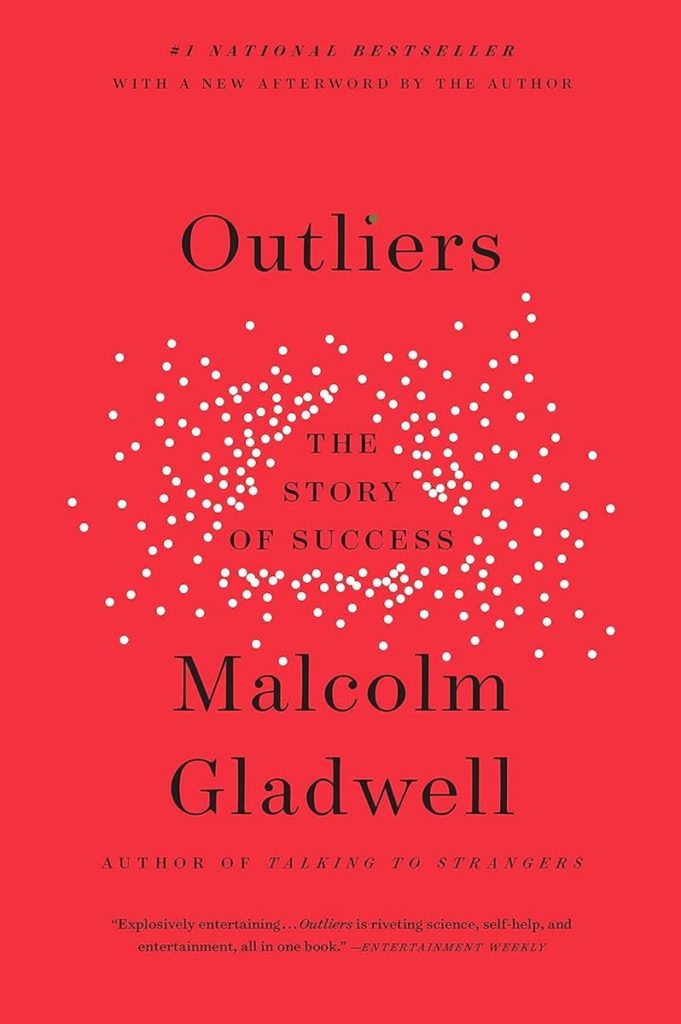4 Life-Changing Lessons from “Outliers” by Malcolm Gladwell:
If You Haven’t Found Success Yet, There May Be Nothing Wrong With You:
Accomplishment, status, wealth, “the good life”, whatever your definition of success, if you haven’t found it yet, you may not be to blame.
In a culture obsessed with success, all focus is on the end product. Fame, fortune, and lifestyle are the emphasis instead of how they were achieved. If talent is discussed, it’s assumed to be natural. “It must be in their blood because look at them now!”
I spent many years seeking my own “special gift”. I would try something new and practice like a maniac until I saw improvement. But I never reached excellence, and it never came easily.
So I’d move on and continue the search.
And repeat.
And repeat.
And repeat.
Until my inspiration, enthusiasm, and energy ran dry.
Was it possible to be destined to search forever or worse to be born gift-less? The prospect was hard to believe, tough to swallow, and honestly pretty heartbreaking.
Then I read Malcolm Gladwell’s “Outliers: The Story of Success”.
“Outliers” challenges traditional views of success, arguing that it’s not just aptitude and hard work that lead to greatness, but a combination of other factors. Here are the insights that helped reshape my understanding of achievement.

Rethinking Success: Beyond Natural Talent
Gladwell uses storytelling and data-driven analysis to debunk the notion that success is solely the result of natural or innate talent. By examining the lives of our society’s successful people, he points out how they weren’t necessarily born with more proficiency than others and uncovers a broader range of influencing factors.
Lesson 1: Culture and Upbringing: The Power of Nurture
Success isn’t just about propensity and practice; it’s deeply influenced by cultural background and your formative years. Your cultural legacy impacts work ethic, communication style, and problem-solving approaches. Understanding the power of your environment can be a solid stepping-stone toward unlocking your true potential.
An example used here is the stereotype of Asian students excelling at math. Gladwell explains that their culturally encouraged positive attitude towards learning and being smart, emphasis on paying attention in school instead of being a class clown, and cultural focus on work ethic is what produces excellent students.
Lesson 2: Privilege and Unobserved Advantages
“Outliers” also sheds light on hidden advantages that often go unnoticed. Having access to education, resources, and support systems can substantially impact the trajectory of success. Acknowledging these privileges, or a lack thereof fosters a more compassionate perspective on individual paths to success.
Whether it’s Bill Gates’ first access to a computer at 13 years old, or The Beatles having the “unique opportunity” to play more than 1200 times during the peak of Hamburg’s music scene, these happenstance events played a pivotal role in their lifetime achievements. Recognizing and capitalizing on unique prospects can be a game-changing springboard to success.
Lesson 3: Redefining the Success Narrative
If you haven’t found success yet, don’t fret, an intricate web of factors contributes to greatness. “Outliers” encourages us to look around; are there any unique circumstances you could be capitalizing on? Do you have access to the education or resources you need? Can you get access through your public library or resources online? What about friends or family with contacts you could leverage?
While cultivating talent points you in the right direction, hard work is what refines your art. Gladwell suggests 10,000 hours is the average needed to have a “mastery” skill level at anything, though this is widely debated. If you have other things in your life, (that pesky thing called work?) you can break it down to a little under 3 hours a day, every day, for ten years. But is that really what you want to spend your most precious currency on?
Lesson 4: Success is Subjective – You Get To Decide How it’s Defined
What do you do before and after work each day? Do you listen to podcasts or music? Spend time with family or friends? Read? Play video games? Watch TV? Which of these things do you value the most? The connection to the world the daily news gives you? The warmth and safety of a family game night? The adventure and escape of a scintillating sci-fi or historical fiction? The joy and laughter as you and your friends share stories and triumphs of the week? How much of that would you be willing to give up for “success”?
All of it?
Half of it?
A third?
How badly do you want this so-called success?
Or perhaps part of the satisfaction in life, the sweetness of life, is the time in between the obligations. Life outside the daily routine where the focus is the moment you’re in right then and there and nothing else. If you have and can appreciate these connected occurrences in your life, many people would already consider you successful. So what role would fame or fortune play for you then?
Are You Already Successful and Just the Last to Know?
It turns out that our beliefs about what society expects are wrong. According to a 2019 Gallup poll Americans think society sees “status” as a major determinant of success. But when they score their own personal success, status matters very little. Character-related attributes were ranked higher than status-related ones across the board. So in reality “society” values character over status? What?!
It’s true – having a purpose in life, enjoying the work you do, having strong ethical values, and doing work that has a positive impact on others are all ranked higher than status-related items. So if you agree that the poll is a representation of “society”, and the poll’s attributes reflect the definition of success, you may already be there – SUCCESSFUL!
Apparently, over the years “the good life” and the definition of success have transformed into whatever each individual wants them to be. What do yours look like?
Malcolm Gladwell’s “Outliers: The Story of Success” is a thought-provoking exploration of the factors of success. Whether personal growth is your aim, or you’re just curious about the stories of high achievers, it does not disappoint.

